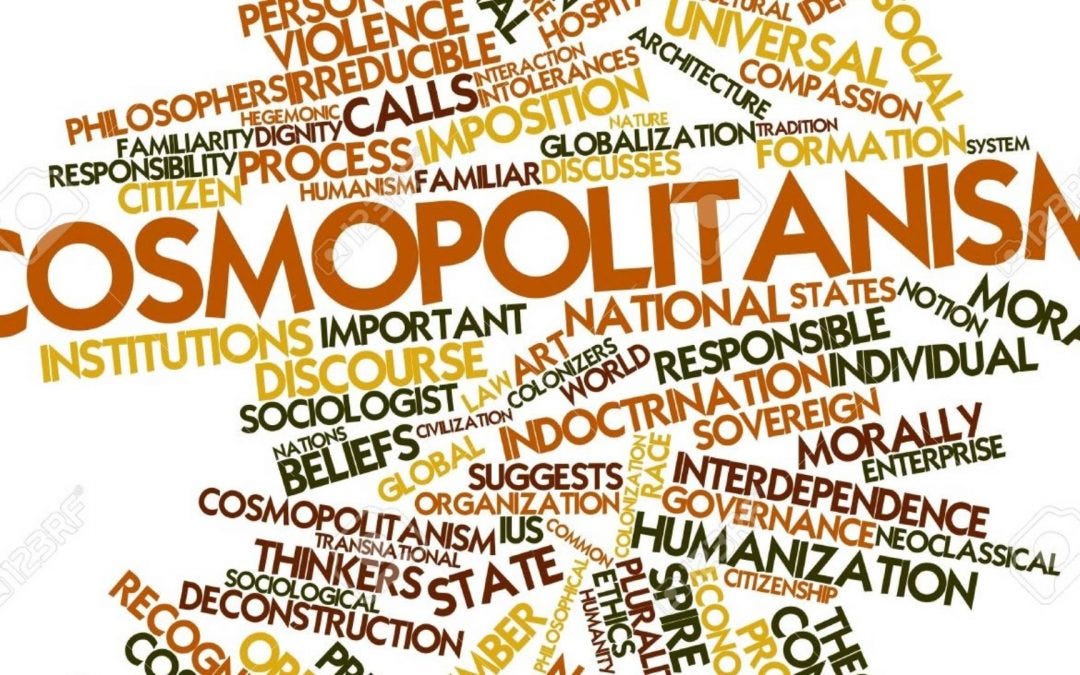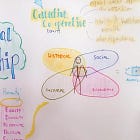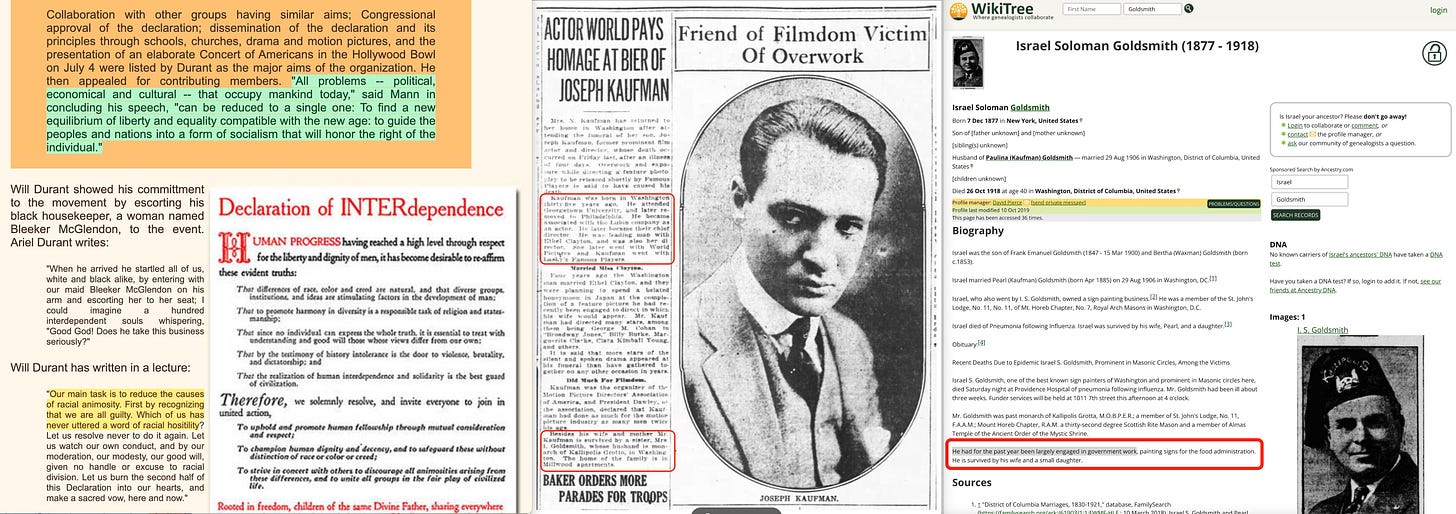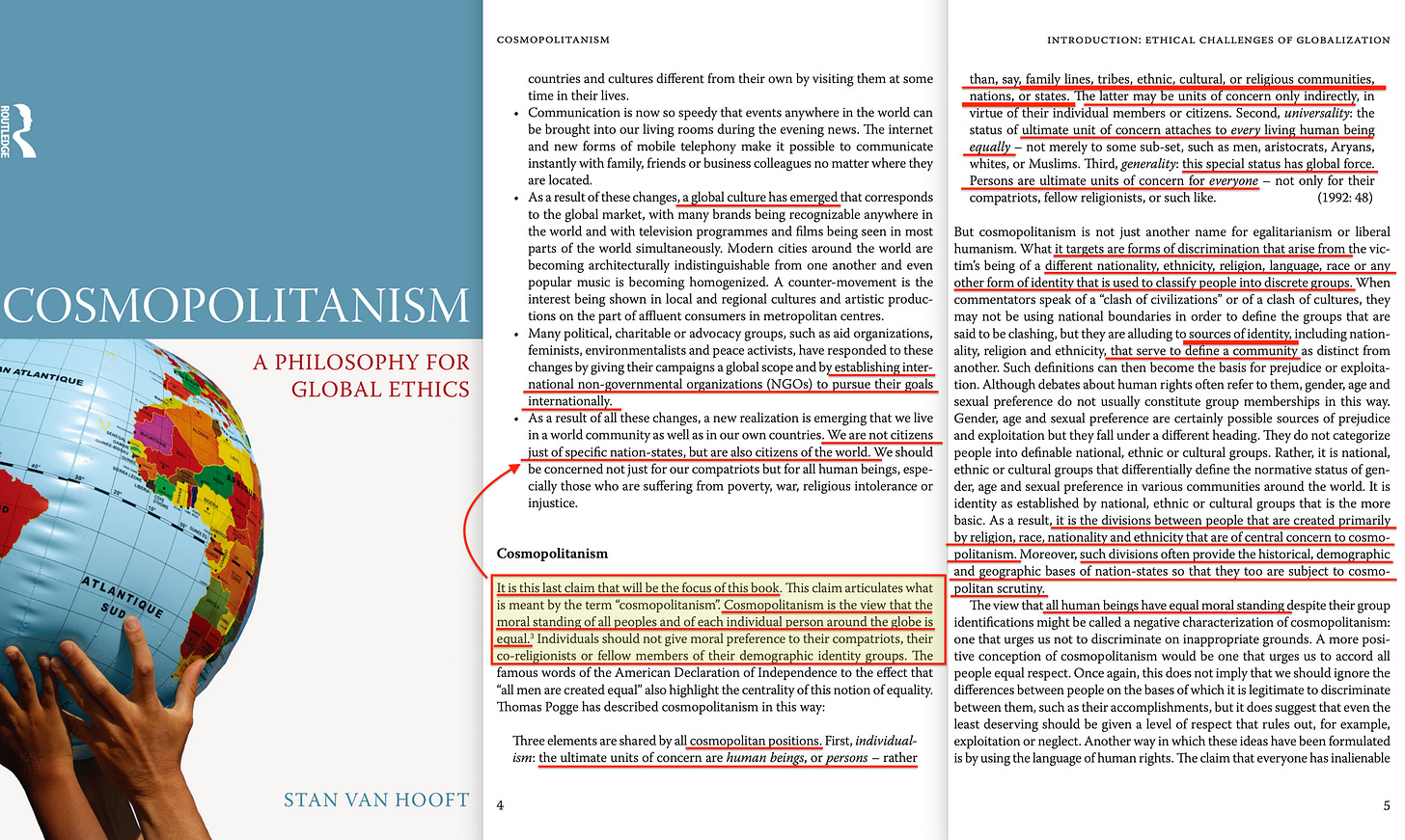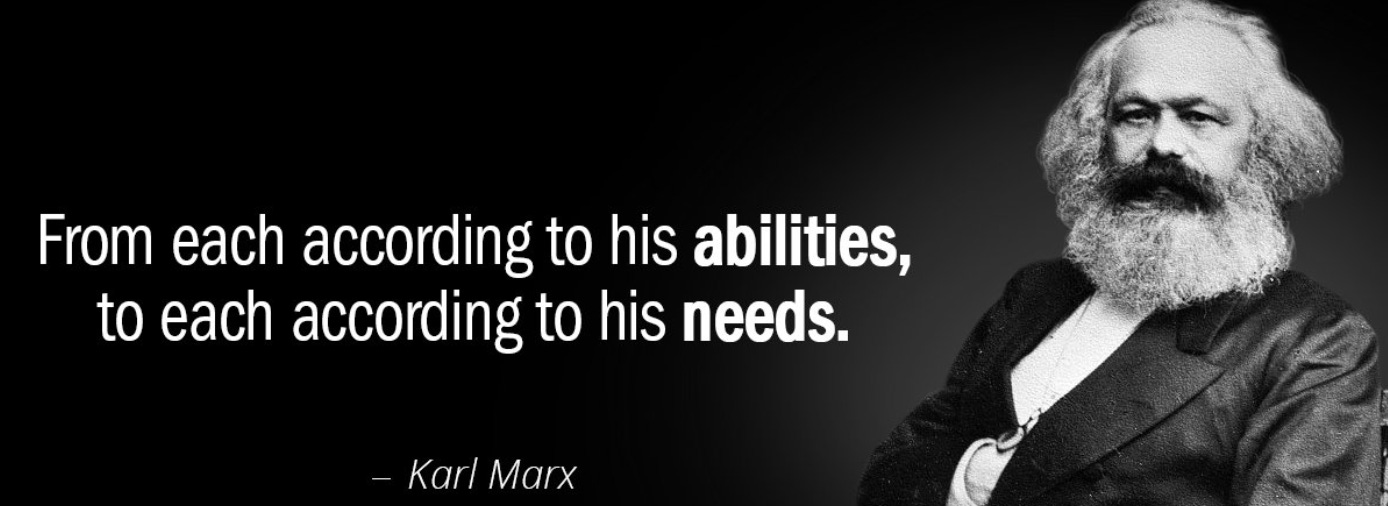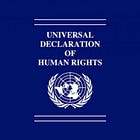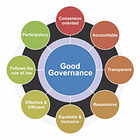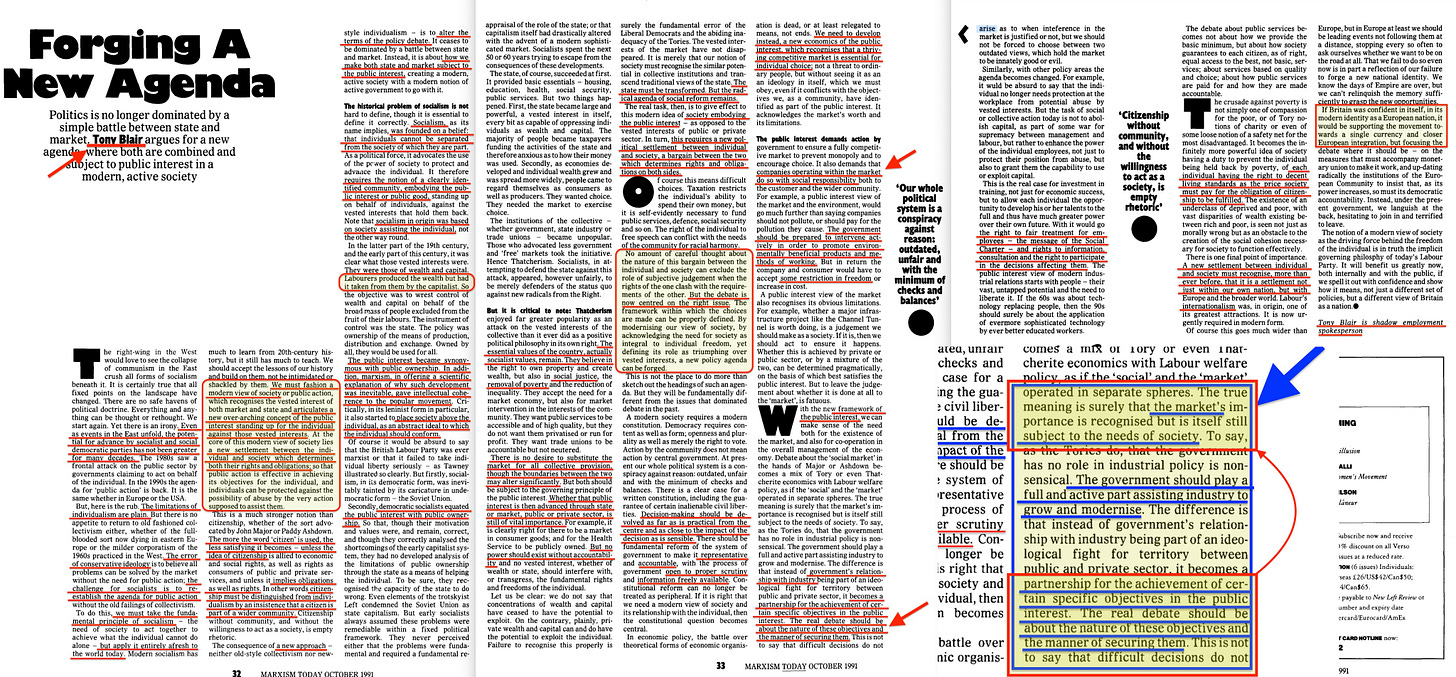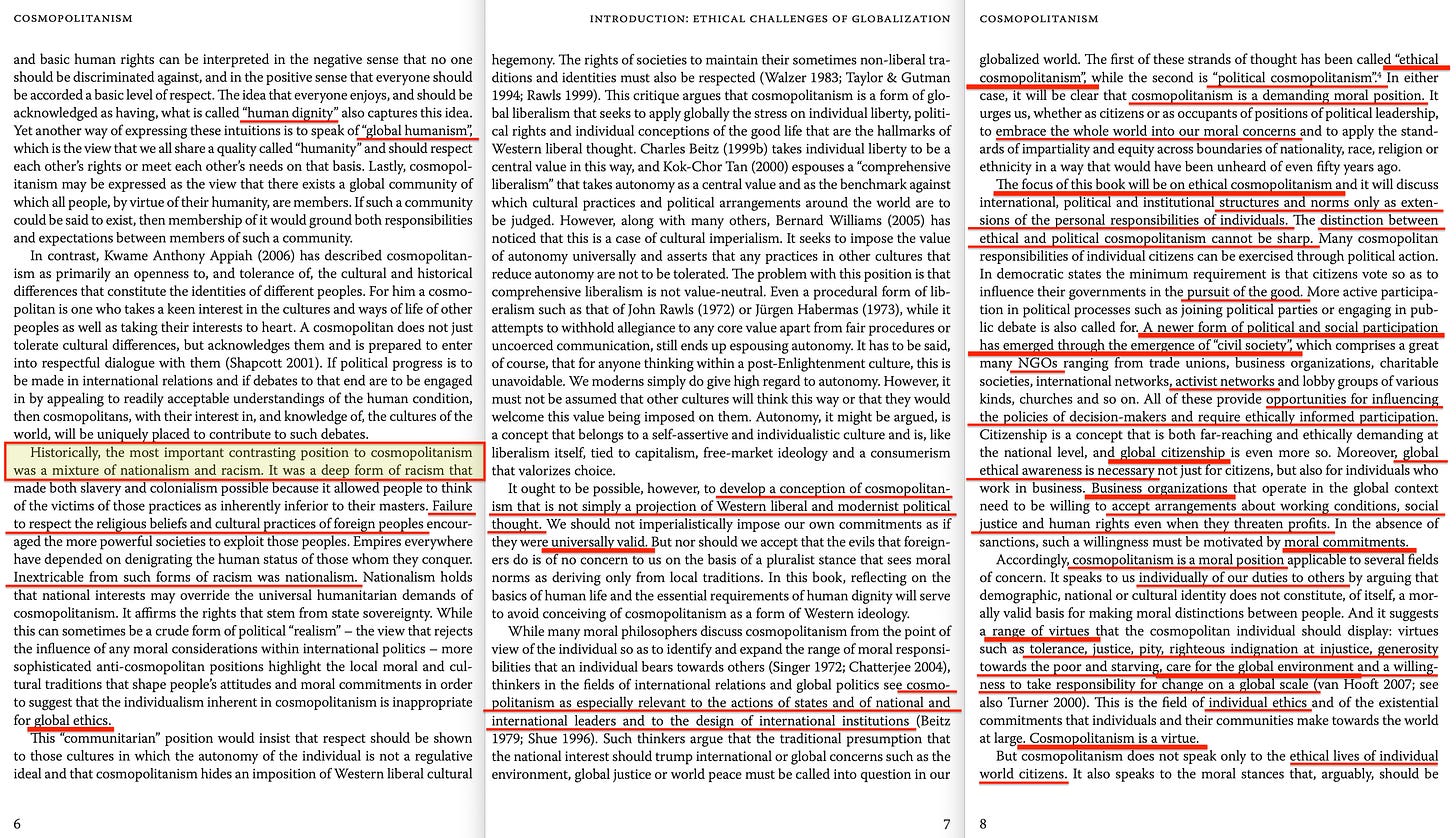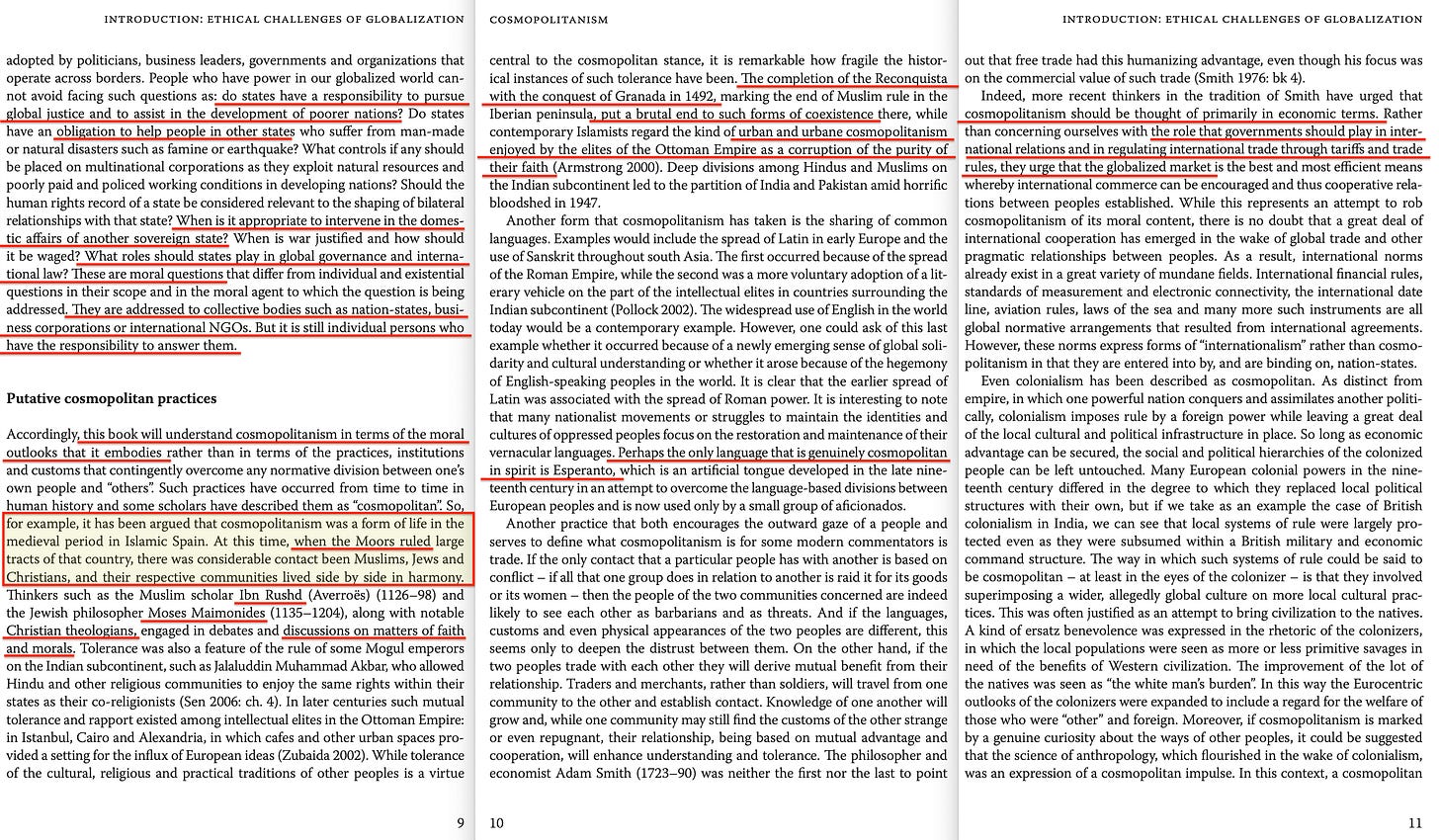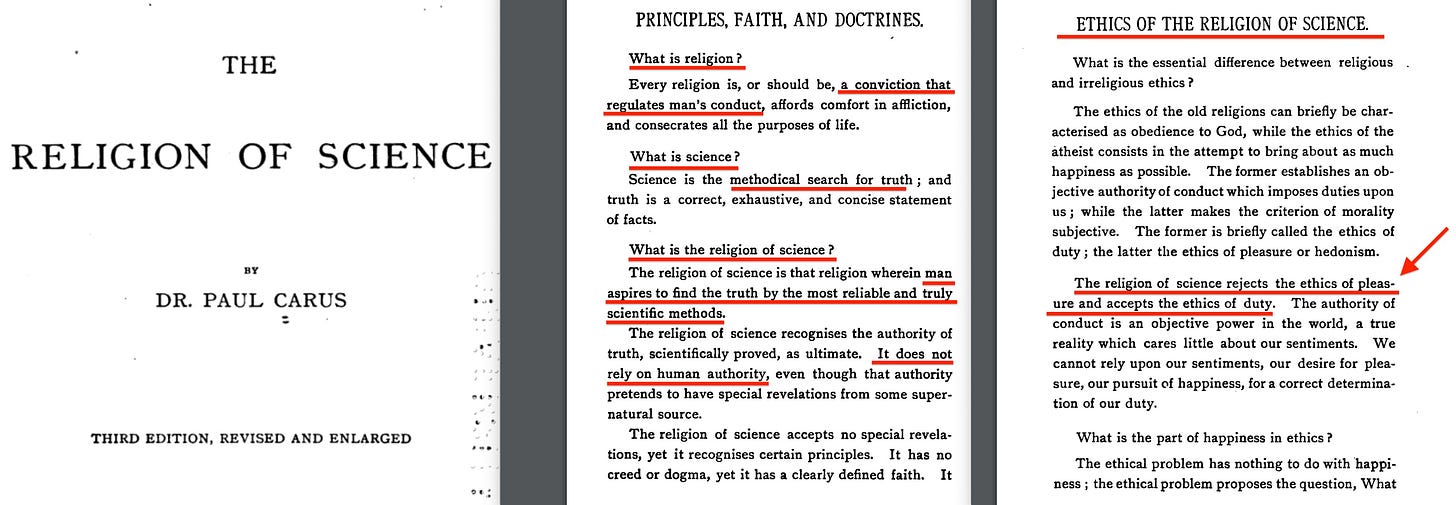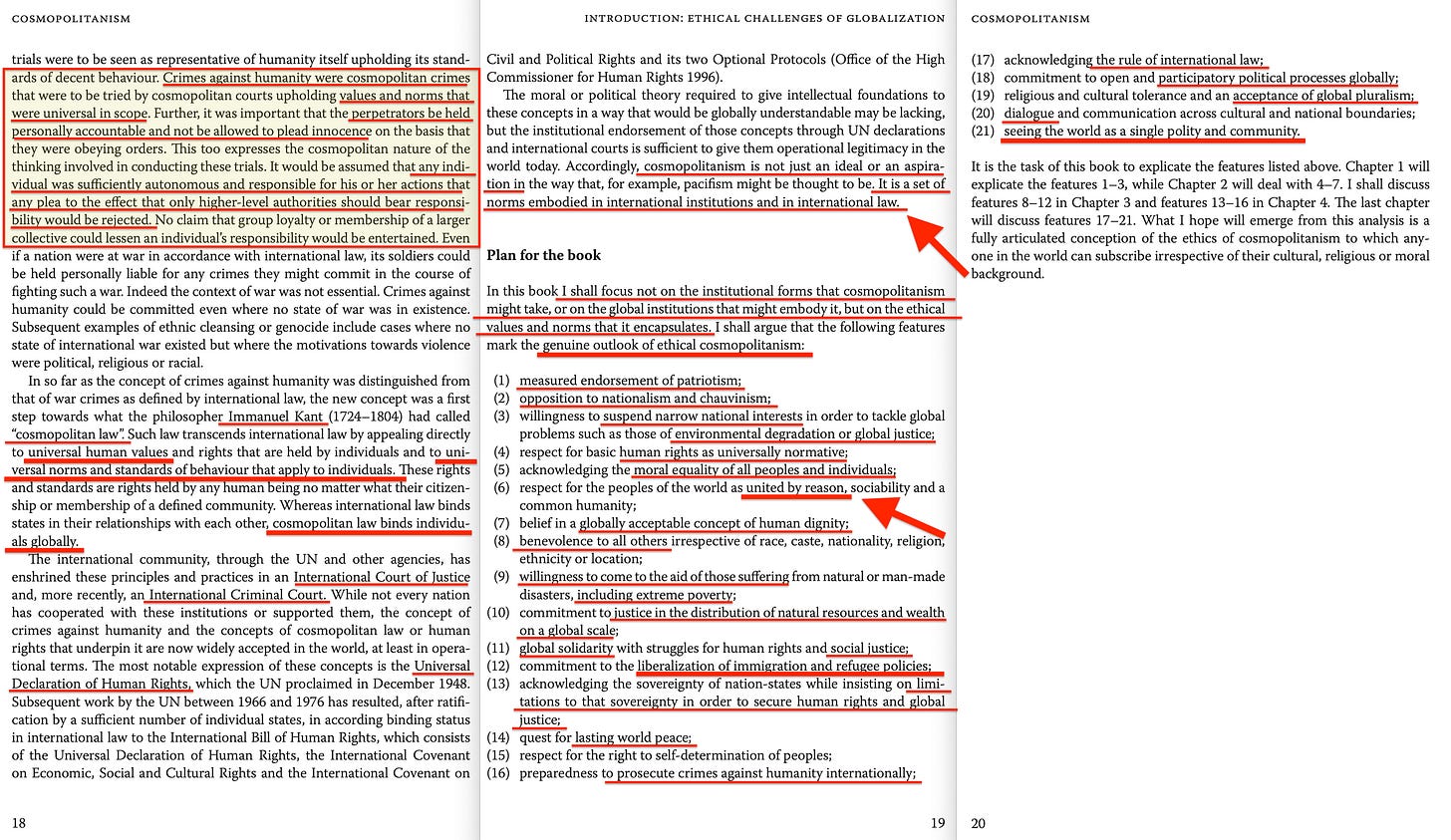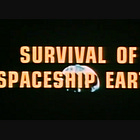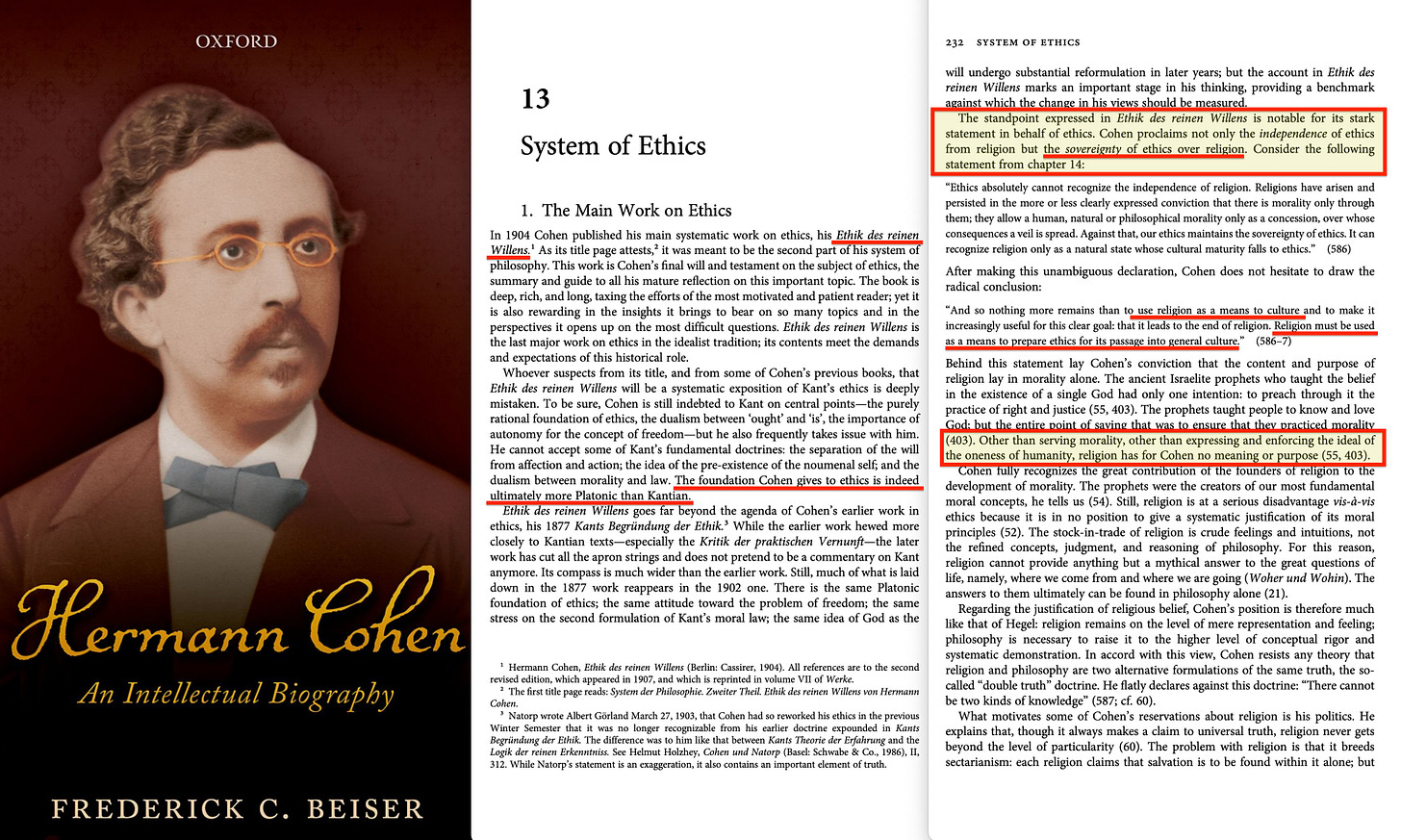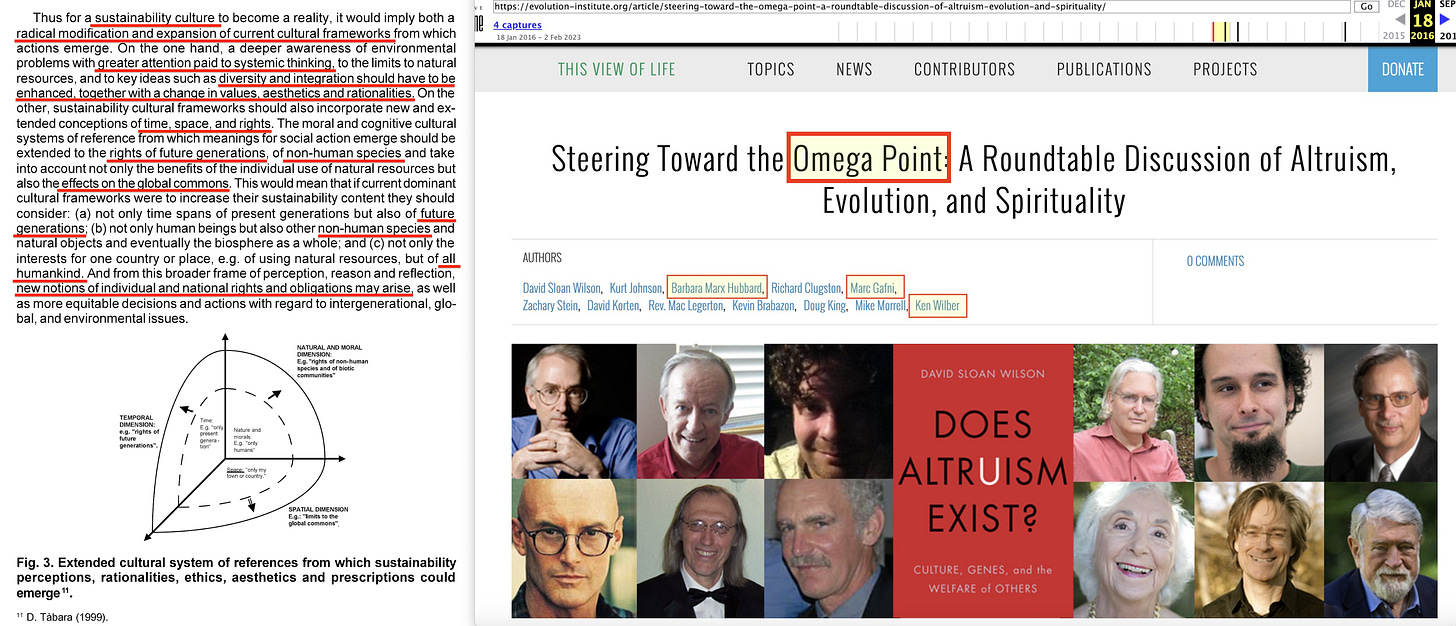Cosmopolitanism
If you read this, chances are that cosmopolitanism is… everything you never wanted - or ever even asked for.
I wasn’t counting on writing this post, but I just came across a book1, and it… beautifully puts together a number of the pieces of the puzzle. And - even better - it’s written by some lunatic who actually appears to believe that this is a good thing.
It’s titled ‘Cosmopolitanism - A Philosophy for Global Ethics‘… oh, global ethics you say?
The early pages inform us that the world has changed due to globalisation, and thus ‘As a result of these changes, a global culture has emerged‘. Further -
‘Many political, charitable or advocacy groups, such as aid organizations, feminists, environmentalists and peace activists, have responded to these changes by giving their campaigns a global scope and by establishing international non-governmental organizations (NGOs) to pursue their goals internationally.‘
The ones which matter are those with General Consultative Status, and those NGOs are commonly funded by foundations.
‘As a result of all these changes, a new realization is emerging that we live in a world community as well as in our own countries. We are not citizens just of specific nation-states, but are also citizens of the world.‘
Oh dear, where to even begin. We have UNESCO’s Global Citizen Education initiative2, we have a totally grassroots driven and definitely not fake ‘Global Citizen Dot Org‘3, which impressively even put together a 46-page report on ‘Covid-19 Recovery’4, a definitely-not-foundation-driven ‘Global Citizen Foundation’5, a definitely-not-fake ‘Global Citizens Initiative’6… I mean, chaps… come one. This is amateur hour. You need to create a little bit of a challenge, you have to invent your own fake terminology and then drape their definitions in dishonest Aesopian language. Didn’t your Marxist university professor teach you this - it’s practically 101 for any reasonable commie professor in the social sciences departments. And as for all those websites… look, you all promote the exact same things. It’s just so obviously fake.
So allow me to create a little bit of a challenge out of it, and find you an obscure reference. Here’s one - principle 10 of the Berlin Principles. Ie, the 2019 update to the Manhattan Principles - which you may know better as One Health.
Incidentally, the Berlin Principles speak of a ‘broad One Health ethical framework’ - which appears apt given the title of the book - which further calls for ‘collaboration that breaks down disciplinary and policy silos‘, and -
‘The current entwined emergencies of public health, biodiversity loss and climate change clearly illustrate the impossibility of protecting human health in isolation from the health of other animals and the environment‘
Well golly gee whiz, it appears that treating your life in line with a mayfly is entirely ethical in their book! It’s just a matter of judgment (and no, not yours).
While we’re at it, let’s drag in SDG 4.7 - Jeffrey Sachs’ favourite -
‘By 2030, ensure that all learners acquire the knowledge and skills needed to promote sustainable development, including, among others, through education for sustainable development and sustainable lifestyles, human rights, gender equality, promotion of a culture of peace and non-violence, global citizenship and appreciation of cultural diversity and of culture's contribution to sustainable development‘
The original book continues - ‘It is this last claim that will be the focus of this book‘, ie, the one relating to ‘we live in a world community… citizens of the world‘.
‘Cosmopolitanism is the view that the moral standing of all peoples and of each individual person around the globe is equal.‘
If there’s one topic I’ve covered a lot over the past year, it’s ethics. Global Ethics. Global Ethics for Global Governance, which clearly relate to cosmopolitanism. And though it personally clicked around the time I went through the WEF’s attempts to… well, censor free speech (let’s call that spade a space), I’d seen inferrals to morality on a number of occasions prior, though I couldn’t quite place it. A notable experience was going through the Motion Picture industry in the early 20th century, where ‘The Spirit of 76’ followed on from ‘the most racist movie every made’….
… and this prompted the launch of the Motion Picture Directors Association7, in whose second of 4 founding articles we find -
‘To cultivate the usefulness and exert every influence to improve the moral, social and intellectual standing of all persons connected with the motion picture producing business;‘
The MPDA was organised by Joseph Kaufman8, whose daughter Ariel9 married Will Durant10 the famous historian, and it was he who in 1945 at the Hollywood bowl launched his ‘Declaration of Interdependence11’ which, in no uncertain terms, is a cry for communism. Thomas Mann12 was a principal speaker at this launch… and he incidentally left the United States in 1952 due to being suspected of communist activity during McCarthyism.
When Joseph Kaufman passed from the 1918 influenza, he was survived by a sister… married to Israel Goldsmith - the Monarch of the Kallipolis Grotto in Washington DC13, supposedly an at-the-time influential chapter, where ‘Kallipolis’ is a term famously used by Plato in The Republic to describe his vision of an ideal city-state governed by philosopher-kings14.
The book continues -
‘Three elements are shared by all cosmopolitan positions. First, individualism: the ultimate units of concern are human beings, or persons - rather than, say, family lines, tribes, ethnic, cultural, or religious communities, nations, or states. The latter may be units of concern only indirectly, in virtue of their individual members or citizens.‘
Cosmopolitanism is about setting aside concern for… all those you instinctively care for. Cosmopolitanism is about caring for, say, rural Mongolian farmers with a sore leg as opposed to your own children. Cosmopolitanism clearly is about hardcore marxism, and Bogdanov’s ‘Human Super-Organism’.
‘Second, universality: the status of ultimate unit of concern attaches to every living human being equally - not merely to some sub-set, such as men, aristocrats, Aryans, whites, or Muslims.‘
Of course, there will be certain exceptions (which is where Levinas comes in, more on this later), but -
‘Third, generality: this special status has global force. Persons are ultimate units of concern for everyone - not only for their compatriots, fellow religionists, or such like.‘
It’s at this stage you perhaps wonder… but why?
‘What it targets are forms of discrimination that arise from the victim's being of a different nationality, ethnicity, religion, language, race or any other form of identity that is used to classify people into discrete groups… they are alluding to sources of identity, including nationality, religion and ethnicity, that serve to define a community as distinct from another.‘
Because this is about Marxist Universalism15 which seeks to dissolve divisions such as class, nationality, and religion to achieve a classless, stateless society16.
And just to hammer home -
‘… what is called "human dignity" also captures this idea. Yet another way of expressing these intuitions is to speak of "global humanism", … and should respect each other's rights or meet each other's needs on that basis.‘
‘Historically, the most important contrasting position to cosmopolitanism was a mixture of nationalism and racism… Failure to respect the religious beliefs and cultural practices of foreign peoples…‘
Wait, what? Just a few pages ago this was about setting aside ‘nationality, ethnicity, religion, language, race or any other form of identity‘, and now, the issue of colonialism was because ‘the religious beliefs and cultural practices of foreign peoples‘ were not respected? This appears about as intellectually coherent as any other half-cooked, deceptive Marxist idea, so add a point on that account. Either way -
‘… more sophisticated anti-cosmopolitan positions highlight the local moral and cultural traditions that shape people's attitudes and moral commitments in order to suggest that the individualism inherent in cosmopolitanism is inappropriate for global ethics.‘
Ah, but we have the traditional subversive attempts to manipulate. See, ‘sophisticated anti-cosmopolitans‘ argue against cosmopolitanism because these are ‘inappropriate for global ethics‘. Very clever. Very clever indeed.
See, according to the manipulative Marxist who wrote this book, it’s not that the counterposition is that the concept of ‘global ethics’ itself is severely flawed, oh no, not at all. It’s that it’s an ‘inappropriate global ethic’. And that is of importance, because Global Ethics is absolutely centric to everything they seek to push through -
‘It ought to be possible, however, to develop a conception of cosmopolitanism that is not simply a projection of Western liberal and modernist political thought. We should not imperialistically impose our own commitments as if they were universally valid.‘
… slowly… slowly… slowly… (wait for it)…
‘While many moral philosophers discuss cosmopolitanism from the point of view of the individual so as to identify and expand the range of moral responsibilities that an individual bears towards others…’
… we add ‘rights and responsibilities’ into the mix (the ‘middle principles’ leading to ‘Global Ethics’, per Leo Swidler17… which rest upon ‘basic principles’ of collectivism… oh, and also - Swidler and Hans Kung frequently collaborated, ie, ‘A Global Ethic’ above)
’… thinkers in the fields of international relations and global politics see cosmopolitanism as especially relevant to the actions of states and of national and international leaders and to the design of international institutions. Such thinkers argue that the traditional presumption that the national interest should trump international or global concerns such as the environment, global justice or world peace must be called into question in our globalized world.’
Global Ethics is the strategy, but to seize power they need a common, global concern, which is where Planetary Ethics enter the stage.
’The first of these strands of thought has been called "ethical cosmopolitanism", while the second is "political cosmopolitanism"* In either case, it will be clear that cosmopolitanism is a demanding moral position.‘
And if this relates globally, then what is obviously called for is global morality, or a Global Ethic. But naturally, manipulative Marxists cannot be honest, because if you understood what they were up to, you’d naturally object -
‘It urges us, whether as citizens or as occupants of positions of political leadership, to embrace the whole world into our moral concerns‘
As citizens… we should consider the whole world… our moral concern. What he’s calling for - in a grossly dishonest way - is a Universal Moral Framework. Like Kant called for18, incidencelly. More on that in a bit.
And adding to the pile of the evidence that this is absolutely coherent with the cohesive structure I’ve spent the past couple of years detailing is outlined through -
‘The focus of this book will be on ethical cosmopolitanism and it will discuss international, political and institutional structures and norms only as extensions of the personal responsibilities of individuals.‘
… Universal Human Rights - and Responsibilities.
‘Many cosmopolitan responsibilities of individual citizens can be exercised through political action. In democratic states the minimum requirement is that citizens vote so as to influence their governments in the pursuit of the good.‘
… Good Governance.
‘A newer form of political and social participation… "civil society", which comprises a great many NGOs ranging from trade unions, business organizations, charitable societies, international networks, activist networks… provide opportunities for influencing the policies of decision-makers and require ethically informed participation.‘
… and that’s where the Trisectoral Networks enter the stage - and using mob rule to influence political decisions was outlined by Tony Blair in 1998.
‘Citizenship is a concept that is both far-reaching and ethically demanding at the national level, and global citizenship is even more so.‘
Blair in 1991 also spoke of reframing the individual as a ‘citizen’ in his 1991 article in Marxism Today19 (covered in ‘The Third Way’ above), speaking of using it as a subtle rhetorical device to attach responsibilities to the individual. And that article also called for public-private collaboration for the common good which you can then link to the general concept of corporatism20 (not to be mistaken for a corporatocracy21) - though the particular implementation they at present angle for is a bespoke version, in close alignment with Lenin’s New Economic Policy.
‘Business organizations that operate in the global context need to be willing to accept arrangements about working conditions, social justice and human rights even when they threaten profits…‘
Even business must abide their ‘ethics’… well, gee.
‘… cosmopolitanism is a moral position… it speaks to use individually of our duties to others… a range of virtues that the cosmopolitan individual should employ‘
It’s a Universal Moral Framework. A Kant’ian one, with -
‘… virtues such as tolerance, justice… care for the environment, and a willingness to take responsibility for change on a global scale’
Environmentalism - Planetary Health - being a primary driver.
The next few pages asks some very interesting questions -
‘… do states have a responsibility to pursue global justice and to assist in the development of poorer nations?‘
And while the ‘development’ also brings with it concepts like Debt-for-Nature Swaps which over the long term will rob 3rd world nations of their prime lands, the former question is actually the one of interest here.
‘Do states have an obligation to help people in other states… When is it appropriate to intervene in the domestic affairs of another sovereign state?’
That would be ‘Responsibility to Protect’22 23, which they will seek to roll out in cases of ‘EcoCide’ (probably ‘international non-crime hate incidents’24 soon enough).
No, really25. They are busy, working to apply the best available scientific consensus in legal context26 right now27.
Next follows -
‘What roles should states play in global governance and international law? These are moral questions… They are addressed to collective bodies such as nation-states, business corporations or international NGOs. But it is still individual persons who have the responsibility to answer them.‘
… that’s a return to the public (nation-states), private (business corporations), or civil society organisations (international NGOs). The UN-specific Trisectoral Network Approach, ultimately based on corporatism (but actually relates closely to Lenin’s NEP). Incidentally, this model was first rolled out through Agenda 21. That document was very, very wishy washy, it was a ‘soft law’ document, but the governance aspect they were pretty clear about.
‘Accordingly, this book will understand cosmopolitanism in terms of the moral outlooks that it embodies…‘
Right, got it. This is about morality. We must strive to become moral citizens.
‘… it has been argued that cosmopolitanism was a form of life in the medieval period in Islamic Spain. At this time, when the Moors ruled large tracts of that country, there was considerable contact been Muslims, Jews and Christians, and their respective communities lived side by side in harmony‘
But apparently, the author of this garbage believes that being a ‘moral citizen’ means telling outrageous, breathtaking lies for sakes of political convenience. Post-conquest, non-Muslims were subjected to the jizya tax and faced legal and social restrictions, marking them as second-class citizens, and with periods of relative tolerance alternated with repression. Further, slavery was widespread, and economic exploitation was rife. The author (Stan van Hooft) here tells nothing short of a brazen, outrageous lie for political expedience… which we’re really only halfway through.
‘Thinkers such as the Muslim scholar Ibn Rushd (1126–98) and the Jewish philosopher Moses Maimonides (1135–1204), along with notable Christian theologians, engaged in debates and discussions on matters of faith and morals‘
Ibn Rushd was persecuted for his efforts, Maimonides is one of its most significant codifiers and commentators in Jewish thought, and he further expanded on the Noahide Code in his seminal work, the ‘Mishneh Torah’, and given how vague Stan’s phrasing is relating to the Christian theologians I assume he speaks of the likes of Hans Kung (‘A Global Ethic’), a senior theologian at the Second Vatican - the event which, essentially, completed the corruption of catholicism.
‘The completion of the Reconquista with the conquest of Granada in 1492, marking the end of Muslim rule in the Iberian peninsula, put a brutal end to such forms of coexistence there, while contemporary Islamists regard the kind of urban and urbane cosmopolitanism enjoyed by the elites of the Ottoman Empire as a corruption of the purity of their faith‘
This one-sided phrasing really does annoy me a great deal. First, he outright lies about the muslim occupation of Spain, and then he frames their loss of Spain in negative terms. There appears to be consistency here - hatred of the West - only for him to excuse blatant corruption during the Ottoman Empire.
Stan, why don’t you get the hell out of Christian nations considering your lies and blatant, one-sided bias - and take your fellow Marxist, Jeffrey Sachs, with you.
This book, honestly, is that clear cut that I will now wrap things up, because I see absolutely no need to spend more than a minimum amount of time on it. Absolutely everything fits into the cohesive structure I’ve spent the past 2 years putting together. It’s further of note that cosmopolitanism - per Stan von Marxist - relates to Stoicism, which - in very brief - focuses on living in harmony with nature and cultivating virtue as the sole good28. And virtue ethics29 is a central concept in Aristotle’s Nicomachean Ethics30, which revolves around his concept of the Golden Mean31.
Consequently, what Stan the Marxist is subversively suggesting - cosmopolitanism relates to living a life of virtuous morality, emphasizing universal justice and harmony among diverse peoples, governed within a threshold of acceptable behavior and ultimately guided (and enforced) through - Global Ethics. And ‘living in harmony with nature’, you might speculate, relates to ‘planetary ethics’.
‘Crimes against humanity were cosmopolitan crimes that were to be tried by cosmopolitan courts upholding values and norms that were universal in scope. Further, it was important that the perpetrators be held personally accountable and not be allowed to plead innocence on the basis that they were obeying orders‘
In Stan’s favoured society, you will not be able to claim ignorance for your crime ‘against humanity’ - whatever that entails. Sure, you can claim to justify it via WW2 crimes, that’s the easy option… but how about EcoCide?
‘It would be assumed that any individual was sufficiently autonomous and responsible for his or her actions that any plea to the effect that only higher-level authorities should bear responsibility would be rejected‘
And in Stan’s favoured society, there will be no appeals court (technically, there will be - but they won’t hear your case, regardless).
‘… Immanuel Kant (1724–1804) had called “cosmopolitan law”. Such law transcends international law by appealing directly to universal human values and rights that are held by individuals and to universal norms and standards of behaviour that apply to individuals… cosmopolitan law binds individuals globally.‘
And in Stan’s favoured society, the universal norms and standard - dictated through global ethics - will apply to all, even if you were ignorant thereof, and with no possibility of appeal.
This is NOT the kind of justice system we have in the West. This is the kind of ‘justice’ system which existed under Stalin or Hitler, justifying arbitrary rule. And the mentions of the International Court of Justice and the International Criminal Court… that’s really, really convenient. More on that later.
‘Accordingly, cosmopolitanism is not just an ideal or an aspiration in the way that, for example, pacifism might be thought to be. It is a set of norms embodied in international institutions and in international law.‘
Cosmopolitanism, which relates to a Universal Moral Framework, should further be legally codified. Got it.
Wait - that’s expressly what Stalin and Hitler did - and it enabled arbitrary rule.
Next follows more keywords I could expand on, but I fail to see the point - with one exception being ‘united by reason’. That’s essentially scientific rationalism. And that essentially describes Paul Carus’s Religion of Science32, which explicitly ‘rejects the ethics of pleasure and accepts the ethics of duty’. Paul Carus, further, was33 a34 freemason35, who coincidentally happened to chair the 1893 World Parliament of the World’s Religions.
No, really. Here he is36, mentioned just below Felix Adler, who founded the New York Society for Ethical Culture, 187637.
But what is ‘ethical culture’, you may ask38. Good question. In very brief - the focus of Felix Adler's ethical culture is functionally similar to Bogdanov's Proletkult.
Oh, I almost forgot - Paul Carus was a leading proponent - and key developer - of the concept of scientific monism. And scientific monism can be considered an evolution of materialistic monism, favored by Karl Marx.
We’re through the core document. But what slightly annoys me here, is that we only located two of the three most influential - yet virtually unknown - individuals, leading to our contemporary malaise. Alexander Bogdanov I consider the most important, he’s virtually impossible to get around. He developed Tektology (the science of Universal Organisational) - which later became General Systems Theory, which West Churchman’s Systems Analysis then fused an ethical framework into, later to be used for adaptive management. And also developed an early version of Wasily Leontief’s Input-Output Analysis, which relates to performing monitoring of a (general) system, where the generated data can be used for feedback analysis and forward prediction, and thus cybernetics. And these in global context, you could describe as Spaceship Earth, Global Surveillance, and Digital Twins.
Alexander Bogdanov was legitimately a genius, to a such extent that I don’t even consider next two truly threatening his majestic status. Especially as he also developed Proletkult - used to manipule the ‘human super-organism’ (organised through tektology) through cultural engineering - and even an early version of the Gaia Hypothesis, centred around carbon dioxide.
The two following… I’m unsure in which order they go. But Paul Carus, in short, fused science with religion through ethics (the religion he considered was Spinoza’s monistic edition of ‘immanence’ - ie, pantheism). He further developed the concept of Scientific Monism, edited two related journals (with Open Court publishing still in existence), chaired the 1893 Parliament of the World’s Religions which gave birth to the ‘Interfaith Movement’. And this movement through the Second Vatican, Hans Kung, and Leo Swidler eventually delivered us ‘A Global Ethic’ at the centennial Parliament of the World’s Religions, 1993. And yet, virtually no-one has ever heard of him. We could even latch Teilhard here, whose fusion of religion and science delivered us ‘evolutionary ethics’, meant to take us to the Omega Point. But the religion Teilhard synthesised wasn’t Spinoza’s 'immanent’ Pantheism, but Panentheism. And the Huxley clan were aware of both Carus and Teilhard.
The third towering figure is Hermann Cohen, a neo-Kantian favouring a ‘Universal Moral Framework’, and whose ‘Infinite Judgment’ recommends the fusion of ethics and law - as we saw take place under Hitler and Stalin. His ‘System of Ethics’ further prioritised ethics over religion, in fact, didn’t see much use for the latter - apart from its utility in terms of programming morality into people.
Hermann Cohen further spoke of our ‘Infinite responsibility for the other’ from a societal perspective, emphasizing reciprocal responsibilities. Martin Buber’s ‘I and Thou’ developed this idea into a first-person perspective, focusing on the relationship between the self and the other. And it was this concept which Emmanuel Levinas further evolved, removing the element of reciprocity and instead proposing an ‘Infinite Responsibility for the Other - even if he does not reciprocate’ (The Pact).
Hans Jonas further develped this concept, extending it into Environmental Justice (acknowledging that the environment cannot reciprocate) and Intergenerational Justice, both of which impose responsibilities without granting corresponding rights. And Jonas is frequently quoted in the works of Hans Kung, whose 1993 ‘A Global Ethic’ initiated the contemporary drive for a Global Ethic.
And - as we previously saw through Leo Swidler - ‘Global Ethics’ rests upon ‘basic principles’ which strongly correlate with collectivism, and ‘middle principles’ which relate to ‘rights versus responsiblities’. And this all takes us to Ken Wilber, whose AQAL is a 2-dimensional application of rights and responsibilities in the temporal and spatial domain. Add concern for nature - as David Tabara39 initially did in 1999 - and you’re left with a 3-dimensional ‘steering mechanism’ which they believe will take us to the Omega Point and thus, Barbara Marx Hubbart’s Conscious Evolution.
And incidentally, here’s Ken Wilber, Barbara Marx Hubbard, the Club of Rome’s Zachery Stein40, and even Marc Gafni, whose ‘Unique Self’ is about accepting being a ‘cell’ in Bogdanov’s ‘human super-organism’. And - by pure coincidence, I’m sure - the title of this conversation is… Steering Toward the Omega Point41.
Case closed.
But when you strip away the glitter, the lies, the incredibly well polished false promises and the manipulative half-truths, what all of this actually is, is Bogdanov’s Scientific Socialism - utilising Lenin’s New Economic Policy approach to economics.
And I will explain why — in the next post.

